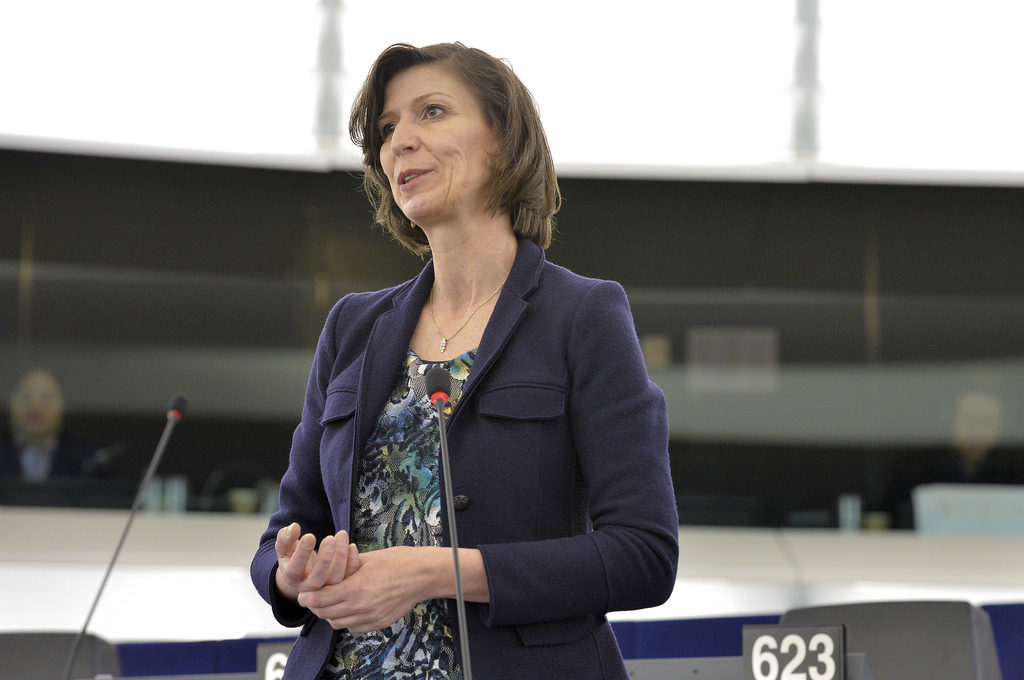Réussite du Parti pour les Animaux au Parlement Européen: pesticides dangereux directement interdits au marché
The European Commission must with immediate effect ensure that hazardous, carcinogenic pesticides will no longer be permitted on the European market and that their use will be prohibited. The Commission was ordered to do so thanks to two proposals of the Party for the Animals in the European Parliament. With this the Party has contributed to a stricter new pesticides act.

Party for the Animals Member of the European Parliament Anja Hazekamp
Research by the food watch dog Foodwatch has recently shown that the European Commission has systematically extended the approval for large numbers of risky pesticides. These extensions were blindly granted without re-evaluating the risks of the substances. This means that European agriculturists and horticulturists are using pesticides which are harmful to people, animals, and the environment.
It was already laid down in the European law in 2015 that five of these pesticides are too dangerous to be used. However, their admission was also extended without being reassessed. Those pesticides are, for example, used for the production of apples, pears, cherries and strawberries, and have been linked to fertility problems and endocrine disruptions with people.
Party for the Animals Member of the European Parliament Anja Hazekamp immediately questioned the European Commission on the result of the Foodwatch research. Last week, she succeeded in enforcing a moratorium on the use of all hazardous pesticides and to stop the automatic extensions of outdated approvals for hazardous pesticides.
Hazekamp: “It is a great victory that the European Parliament finally realises that action should be taken. These substances do not belong in our food. The Commission has the obligation to ensure that only substances are approved which are not harmful to people, animals, and the environment. The European Ombudsman already concluded that the Commission is way too soft, resulting in many substances being on the market while they should not be. This is finally going to end.”
Concerns about animal testing, but no action
Hazekamp has also submitted two proposals concerning the use of animal testing for pesticides. One of those proposals was adopted by the European Parliament: this shows that the parliament is concerned with the fact that the use of animals for testing in respect of hazard identification and risk assessment does not comply with the requirements of the 3 Rs (replacement, reduction and refinement) of the EU Directive 2010/63 concerning animal testing.
However, the parliament’s concerns were obviously not great enough: Hazekamp’s proposal requiring a ban on animal testing in all research and assessment procedures for pesticides was not adopted.
La Commission Européenne doit immédiatement veiller à ce que les pesticides nocifs et cancérigènes ne soient plus autorisés sur le marché européen et que leur utilisation soit interdite. La Commission a reçu cette mission de la part du Parlement Européen grâce à deux propositions du Parti pour les Animaux. Ainsi, le Parti a contribué à une nouvelle loi plus stricte sur les pesticides.

Eurodéputée du Parti pour les Animaux Anja Hazekamp
Des recherches menées par l’organisme de surveillance des aliments Foodwatch ont récemment révélé que la Commission Européenne avait systématiquement renouvelé l’approbation d’un grand nombre de pesticides à haut risque. Ces approbations ont été émises gratuitement, sans que les risques liés aux substances en question eut été réévalués. Cela signifie que les agriculteurs et les jardiniers européens utilisent des dizaines de pesticides dangereux pour l’homme, les animaux et l’environnement.
Pour cinq de ces soi-disant pesticides, il a déjà été déterminé en 2015 dans la législation européenne qu’ils étaient trop dangereux pour être utilisés. Mais leur utilisation a également été approuvée sans réévaluation. Ces produits sont utilisés par exemple dans la culture des pommes, des poires, des cerises et des fraises tandis qu’ils sont associés à des problèmes de fertilité et de perturbation des hormones.
Anja Hazekamp, eurodéputée du Parti pour les Animaux, a immédiatement posé des questions à la Commission Européenne à la suite de l’enquête de Foodwatch. La semaine dernière, elle a également réussi à imposer un moratoire sur l’utilisation de tous les pesticides dangereux et à mettre fin aux renouvellements automatiques d’approbations datées de pesticides nocifs.
Hazekamp: « Il s’agit d’une victoire énorme, étant donné que le Parlement Européen reconnaît maintenant aussi qu’il faut agir. Ces substances n’ont pas leur place dans notre alimentation. La Commission a le devoir d’assurer que seules les substances qui ne sont pas nocives pour l’homme, les animaux et l’environnement soient approuvées. Le Médiateur Européen avait déjà conclu que la Commission est beaucoup trop indulgente, laissant la porte ouverte à ce que de nombreuses substances sont injustement commercialisées. Le problème va enfin être abordé. »
Préoccupation à propos des tests sur les animaux, mais pas d’action
Hazekamp a également soumis deux propositions sur l’utilisation de tests sur les animaux en relation avec les pesticides. L’une de ces propositions a été adoptée par le Parlement Européen: ainsi le Parlement manifeste ses inquiétudes concernant le fait que l’utilisation des animaux dans les tests pour l’identification des dangers et l’évaluation des risques n’est pas conforme à l’exigence des 3 R (remplacement, réduction et raffinement) de la Directive 2010/63/UE sur l’expérimentation animale.
Mais les préoccupations du Parlement n’étaient apparemment pas assez importantes: la proposition de Hazekamp, qui demandait l’interdiction des tests sur les animaux dans toutes les procédures de recherche et d’évaluation des pesticides, n’a pas été acceptée.